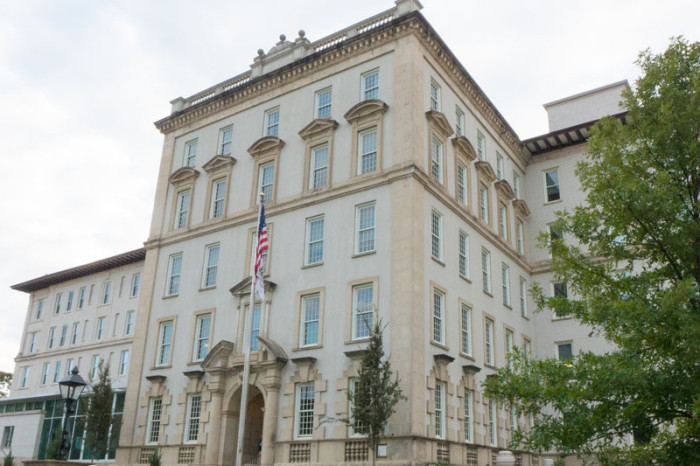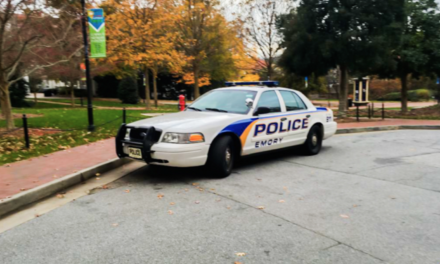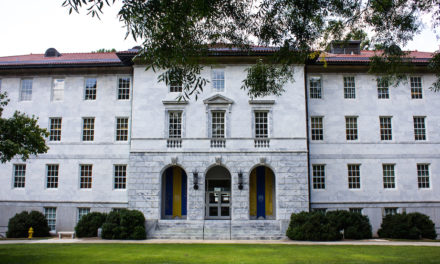Emory University Hospital received an Ebola patient from Dallas, Texas for treatment in its special isolation unit Wednesday night, according to an Oct. 16 University press release.
The patient, reported by CNN to be Texas Health Presbyterian Hospital nurse Amber Joy Vinson, is the fourth Ebola patient to be treated at Emory Hospital.
Vinson, 29, arrived at Emory Hospital Wednesday night at approximately 8:30 p.m. On Wednesday morning, Emory Healthcare was asked to care for Vinson in its Serious Communicable Disease Unit (SCDU), according to an Oct. 15 all-Emory email sent by Associate Vice President of Communications and Executive Director of Media Relations Nancy Seideman on behalf of Emory Healthcare President and CEO John Fox and Chief Quality and Medical Officer of Emory Healthcare Bill Bornstein. “We are pleased and proud to be able to care for this, now fourth, individual,” the email stated.
Vinson and another nurse, Nina Pham, 26, contracted Ebola after treating Thomas Eric Duncan, a Liberian national who was infected with the first case of Ebola diagnosed in the United States. Duncan died from the illness on Oct. 8.
Reports from Texas Health Presbyterian Hospital state that Vinson and others in contact with Duncan did not have proper protective gear or training to handle the virus adequately.
Chief Clinical Officer for Texas Health Services Daniel Varga acknowledged in a Oct. 16 congressional hearing that there were “mistakes” in the treatment of Duncan, according to an Oct. 16 CNN article.
“We did not correctly diagnose Duncan’s symptoms as those of Ebola,” Varga said at the hearing. “We are deeply sorry.”
Vinson reported symptoms of Ebola merely hours after flying on a commercial jet from her home in Ohio back to Dallas.
Emory Hospital is home to one of four special isolation units in the country designed to handle infectious diseases.
College junior Fuad Haddad says he is impressed by Emory’s response and key role in the treatment of Ebola in the United States, but the media coverage is not healthy.
“I think the media is blowing up Ebola for the sake of views instead of focusing on the initiatives to promote quality of life for those who are affected,” Haddad said. “We are blessed to be at an institution that is the cornerstone of a chapter in medical history, a feat which no other place can claim.”
College junior Elyssa Hausman also feels Emory is doing a good job, adding that privacy should be considered when dealing with the Ebola patients’ lives.
“Emory is more than capable of caring for these individuals and I am certain that these facilities, nurses, doctors and staff are going to do all that they can to save the lives of these patients, both in the present and the future,” Hausman said.”While it’s important to give recognition to those who are enduring the battle against this virus, we need to remember they are still human … we get caught up in the hype of ‘breaking news’ that we neglect their privacy.”
As reported in an Aug. 29 Wheel article, Emory’s isolation unit is physically separate from the rest of the hospital community and is run by a team highly trained in specific and unique protocols and procedures necessary to treat and care for Ebola patients.
“Emory University Hospital has a specially built isolation unit set up in collaboration with the Centers for Disease Control (CDC) to treat patients who are exposed to certain serious infectious diseases,” Associate Vice President of Communications Vince Dollard wrote in a July 31 all-Emory email.
According to World Health Organization numbers released on Oct. 16, the disease has infected close to 9,000 people and killed over 4,500, including 236 health workers.
Transmission of the virus comes from “direct contact with the blood or secretions of an infected person or exposure to objects (such as needles) that have been contaminated with infected secretions,” according to the CDC website on Ebola.
According to the press release, the third Ebola patient, who is still being treated and whose identity has yet to be disclosed, released a statement regarding treatment in response to national news about Ebola and health care workers.
“Given the national focus on Ebola, particularly with the diagnosis in two health care workers, I want to share the news that I am recovering from this disease, and that I anticipate being discharged very soon, free from the Ebola virus and able to return safely to my family and to my community,” the statement said.
“As a result of the virus, my condition worsened and I became critically ill soon after I arrived at Emory. Through rigorous medical treatment, skillful nursing and the full support of a health care team, I am well on the way to a full recovery. I want the public to know that although Ebola is a serious, complex disease, it is possible to recover and return to a healthy life. I wish to retain my anonymity for now, but I anticipate sharing more information in future weeks as I complete my recovery,” the statement added.
– By Stephen Fowler, Assistant News Editor
This post was updated 2:15 p.m., Oct. 17 to change the placement of College junior Fuad Haddad’s quote.
Stephen Fowler 16C is the political reporter at Georgia Public Broadcasting, the statewide NPR affiliate in Georgia. He graduated from Emory with a degree in Interdisciplinary Studies and covered the central administration and Greek Life for the Wheel before serving as assistant news editor, Emory Life editor and the Executive Digital Editor from 2015-16.







